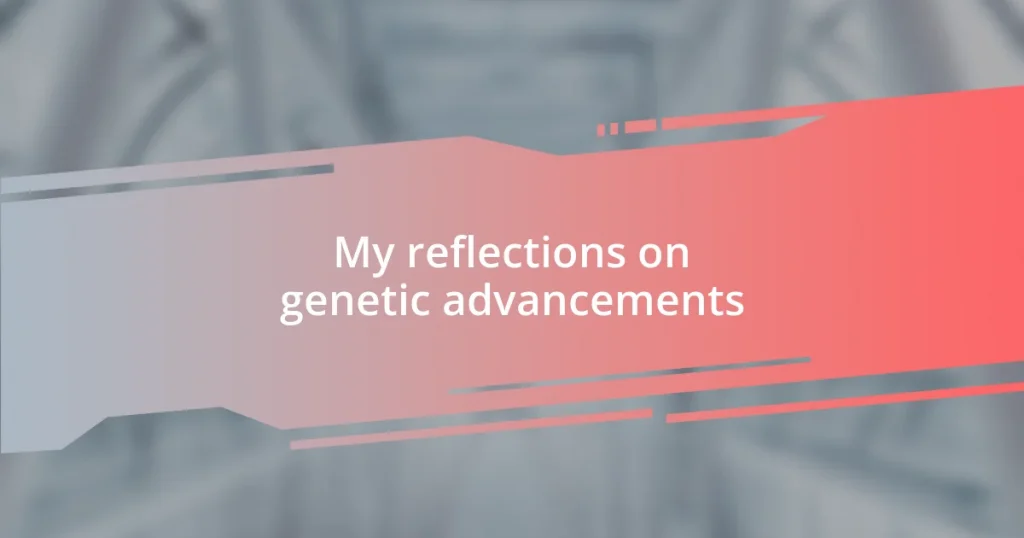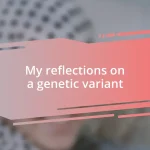Key takeaways:
- The advent of CRISPR technology in 2012 revolutionized gene editing, raising ethical questions about manipulating life and human identity.
- Key historical milestones, from Mendel’s experiments to the Human Genome Project, have significantly advanced our understanding of genetics and paved the way for modern applications.
- Emerging trends in gene therapy and synthetic biology offer transformative potential for medicine and environmental solutions, while also highlighting ethical concerns and disparities in access to these advancements.
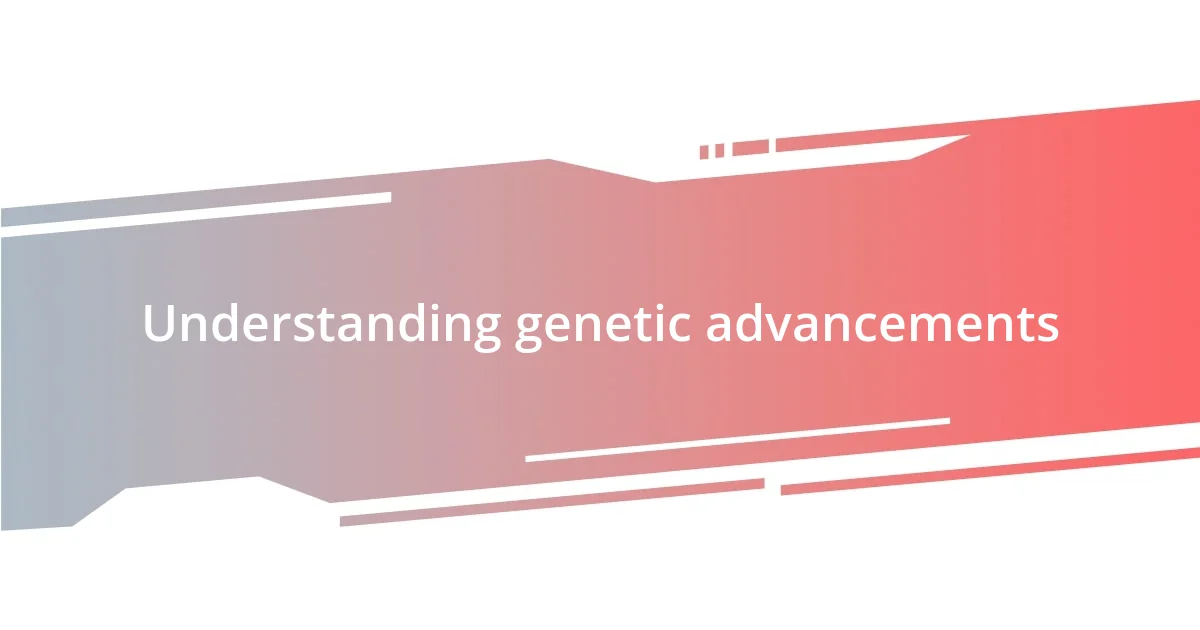
Understanding genetic advancements
Genetic advancements have transformed our understanding of biology, opening doors that once seemed firmly closed. I remember the first time I learned about CRISPR technology—it felt like stepping into a science fiction novel. This revolutionary tool allows scientists to edit genes with unprecedented precision, raising questions about the ethical implications of manipulating life itself.
As I delved deeper, I realized how these advancements could tackle complex issues like genetic disorders. It struck me that the possibility of curing diseases that have plagued families for generations isn’t just a dream anymore; it’s within our grasp. Can you imagine a world where conditions like cystic fibrosis or sickle cell anemia could be effectively eliminated? It’s both exciting and daunting to think about how this might change personal narratives and entire communities.
Reflecting on these breakthroughs, I often ponder the balance between innovation and responsibility. As we unlock the secrets of DNA, how do we ensure that the power we wield is used ethically? I find myself torn between fascination and caution, as these advancements could redefine what it means to be human, challenging our moral compass in profound ways.
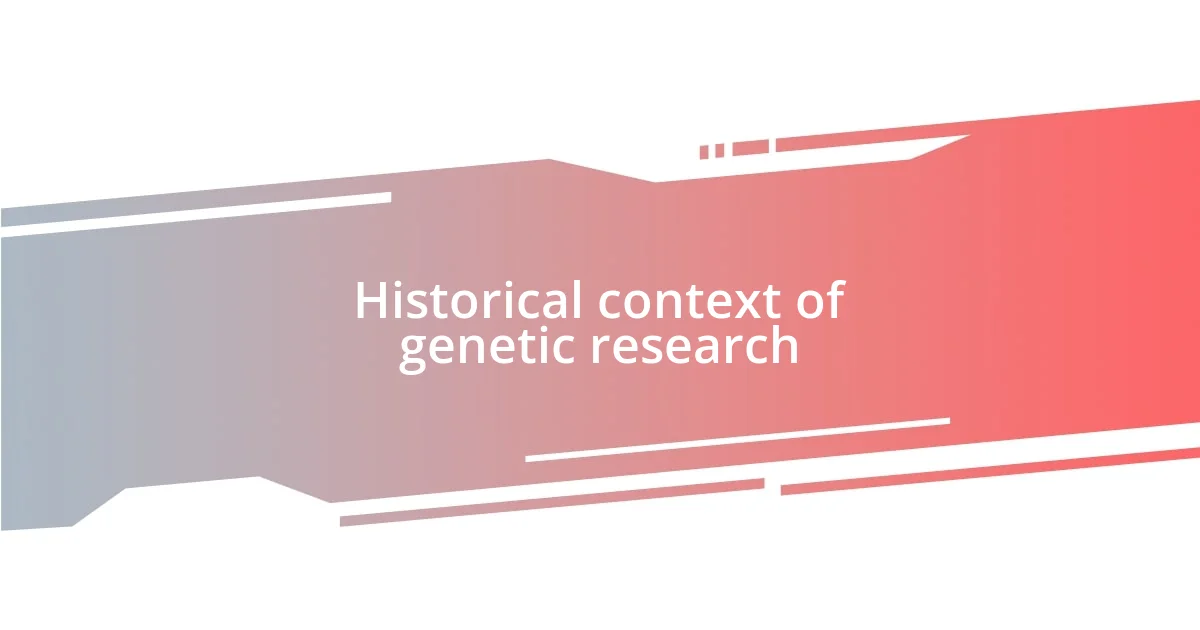
Historical context of genetic research
The history of genetic research is a fascinating journey marked by groundbreaking discoveries that reshaped our understanding of life. I still remember my college days, pouring over my genetics textbook, fascinated by Mendel’s pea plant experiments. His principles of inheritance laid the foundation for modern genetics, revealing how traits are passed down through generations. The way those little plants illustrated complex ideas was like watching a puzzle come together.
- 1866: Gregor Mendel publishes his work on pea plants, establishing the basic laws of inheritance.
- 1953: James Watson and Francis Crick discover the double helix structure of DNA, catalyzing the field of molecular biology.
- 1977: Frederick Sanger develops DNA sequencing, allowing scientists to determine the exact sequence of nucleotides in a DNA molecule.
- 1990: The Human Genome Project begins, aiming to map all the genes in the human genome, which greatly advances our understanding of genetics.
- 2012: The CRISPR-Cas9 technology emerges, allowing for precise editing of DNA, marking a revolutionary moment in genetic research.
These milestones resonate with me not just as scientific achievements but as defining moments in our quest to understand the very fabric of life. Each advancement felt like a step closer to unlocking the mysteries of our existence, turning abstract concepts into tangible possibilities.
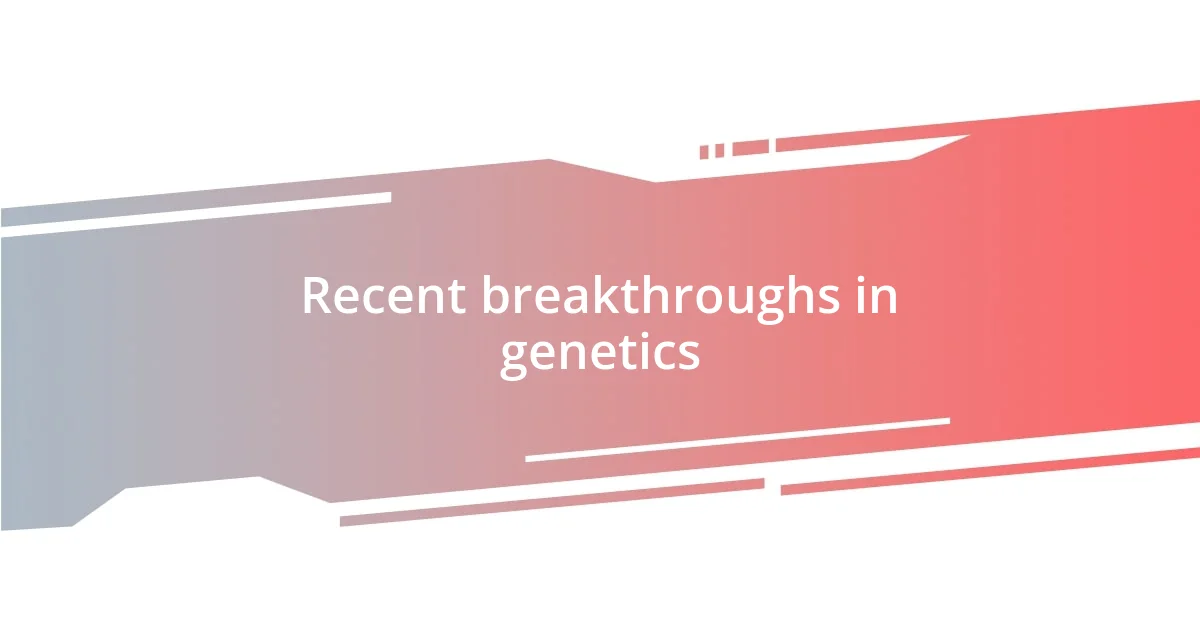
Recent breakthroughs in genetics
Recent breakthroughs in genetics have unveiled opportunities I never dreamed could exist. For instance, the development of gene therapies has shown remarkable promise, bringing hope to those affected by genetic disorders. When I first heard about a child who was treated for spinal muscular atrophy—an illness that once meant a life of immense challenges—I felt a wave of emotions. This wasn’t just a news story; it was a testament to how far we’ve come and how these innovations can transform lives.
Moreover, the advent of synthetic biology is something I find utterly fascinating. It’s revolutionizing how we approach complex diseases and environmental issues. Just think about it: organisms are now being engineered to produce biofuels or even clean up pollution. I recall a project I read about where scientists engineered bacteria to eat oil spills. The ingenuity behind such applications is truly inspiring and opens up discussions about sustainability and future possibilities.
The ethical conversations surrounding these advancements also resonate deeply with me. While the progress is exciting, I can’t help but think about the implications of creating life or altering ecosystems. How do we navigate these moral landscapes? It reminds me of the classic dilemma about playing God. I’m left wondering how society will address these profound questions while ensuring we use our knowledge responsibly.
| Breakthrough | Description |
|---|---|
| Gene Therapy | Involves altering genes to treat or prevent diseases, showing potential in curing conditions like spinal muscular atrophy. |
| Synthetic Biology | Engineering organisms to perform useful functions, such as remediating environmental pollutants or producing alternative fuels. |
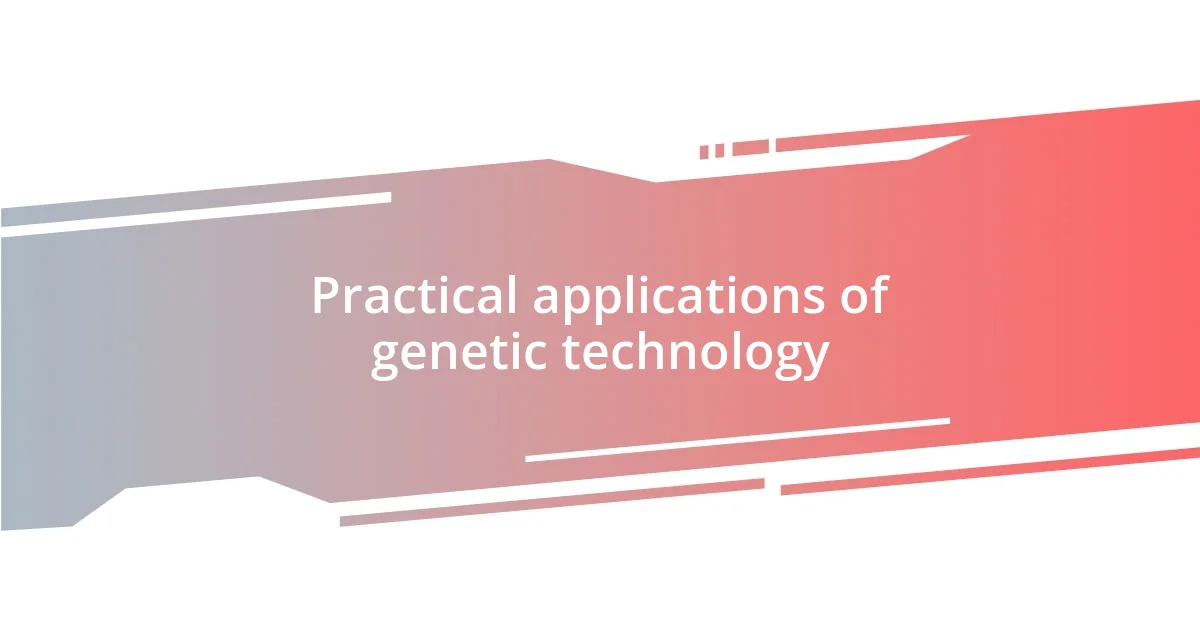
Practical applications of genetic technology
The practical applications of genetic technology truly amaze me, especially in the realm of agriculture. I remember visiting a local farm that showcased genetically modified crops engineered for pest resistance. Standing among those vibrant plants, I felt a sense of hope; farmers can now produce more food with fewer resources. This innovation not only enhances food security but also reduces the need for chemical pesticides, benefiting both our health and the environment.
Another area that strikes me as profoundly transformative is direct-to-consumer genetic testing. I’ve had conversations with friends who decided to explore their ancestral roots through such tests. It’s a revelation to learn about one’s genetic heritage. But then, I think about the ethical aspects—how much do we really want to know? Are we ready for the potential emotional ramifications that come from uncovering hidden family secrets or health predispositions?
The use of genetic technology in personalized medicine is equally fascinating to me. Imagine a future where your doctor prescribes treatments based on your unique genetic makeup. I recall a colleague who underwent a personalized treatment plan that proved far more effective than traditional approaches for her cancer. That kind of tailored healthcare feels like stepping into a new era, yet it also raises questions: How do we ensure access to these advanced therapies for everyone? Are we creating a divide in healthcare based on genetic information?
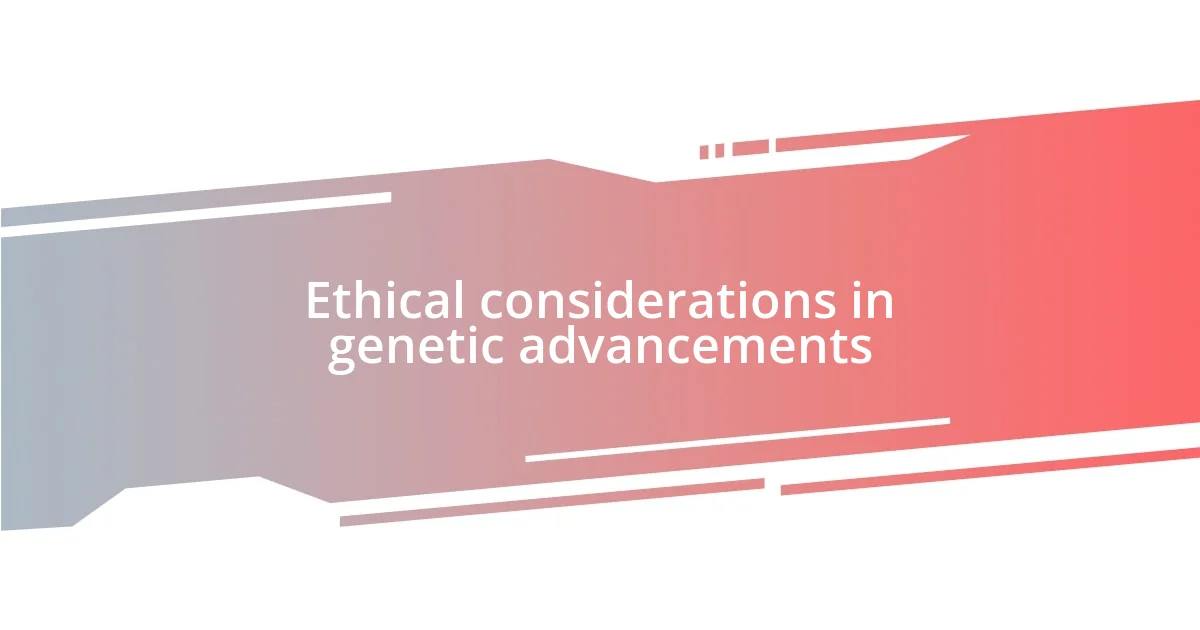
Ethical considerations in genetic advancements
The ethical considerations surrounding genetic advancements are a complex web I often find myself untangling. I remember attending a bioethics seminar where a professor posed a chilling question: “At what point do you stop improving nature and start playing God?” That question resonated with me long after the discussion ended. It’s a delicate balance—advancing human health while respecting the natural order.
Moreover, the possible repercussions of gene editing, such as CRISPR technology, can stir a mix of fascination and anxiety. During a recent chat with a fellow researcher, we pondered the implications of editing embryos. It made me reflect on the idea of designer babies. Will we end up prioritizing certain traits over others? It sent shivers down my spine. The thought of selecting for intelligence or physical appearance feels like stepping into a moral gray area.
Access to genetic breakthroughs also weighs heavily on my mind. While I admire the innovations, I often think about people in underserved communities who might be left behind. During a community forum, I heard heartfelt stories about families affected by genetic disorders whose access to cutting-edge treatments was limited. Will we create a world where only the wealthy can afford these advancements? This disparity raises questions about fairness and equity in healthcare that we can no longer ignore.
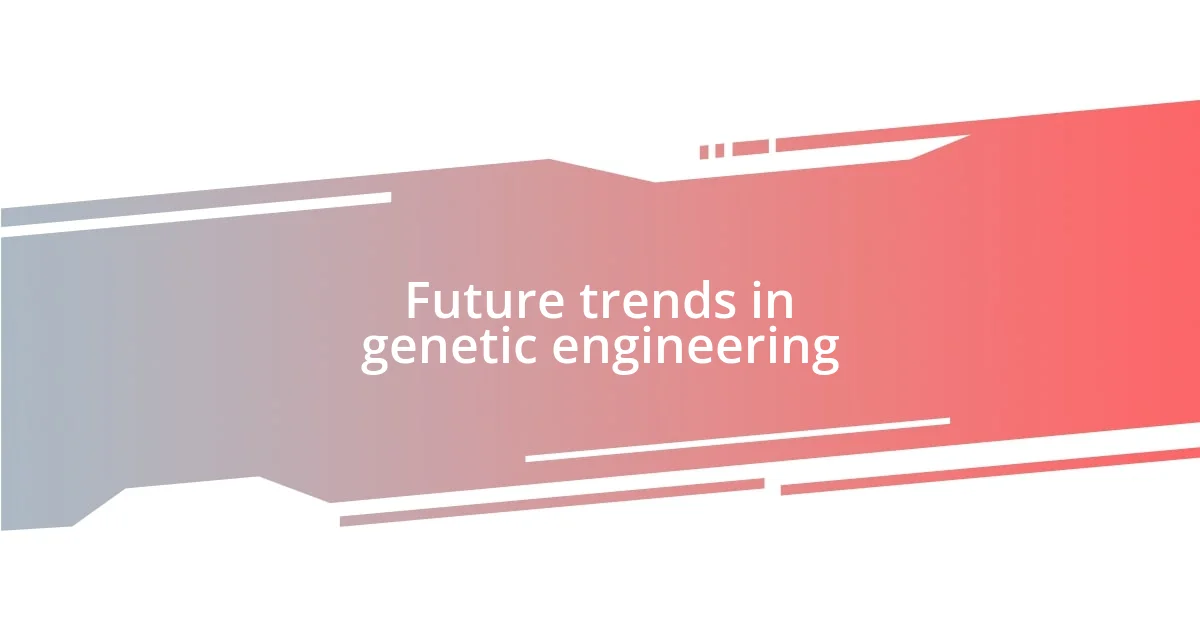
Future trends in genetic engineering
As I think about future trends in genetic engineering, I can’t help but feel a mix of excitement and caution, especially with the rise of gene editing technologies like CRISPR. I remember attending a workshop where researchers passionately discussed the possibility of eradicating genetic diseases. Imagine a world where we could prevent ailments like cystic fibrosis before a child even takes their first breath. Yet, will we have the wisdom to use this power responsibly, or will it lead us down a slippery slope of unintended consequences?
Looking ahead, I see another major trend in the realm of synthetic biology, where organisms are being engineered to produce useful materials like biofuels. At a recent sustainability conference, I was captivated by a demonstration of bacteria that could break down plastic waste. It was a moment that sparked a wave of hope in me—what if we could harness these living organisms to solve our environmental crises? But it also raised questions about the long-term impacts on ecosystems. Are we prepared for potential fallout in biodiversity?
Moreover, the concept of gene therapy is rapidly advancing. I recall a personal story shared by a close friend whose child suffers from a rare genetic disorder. Hearing them describe their journey of hope as they explored gene therapy options truly moved me. Will this become a common narrative in the coming years? I wonder how we’ll navigate the emotional rollercoaster that accompanies such revolutionary treatments. Balancing the promise of improvement with the reality of ongoing ethical dilemmas will undoubtedly be a challenge.
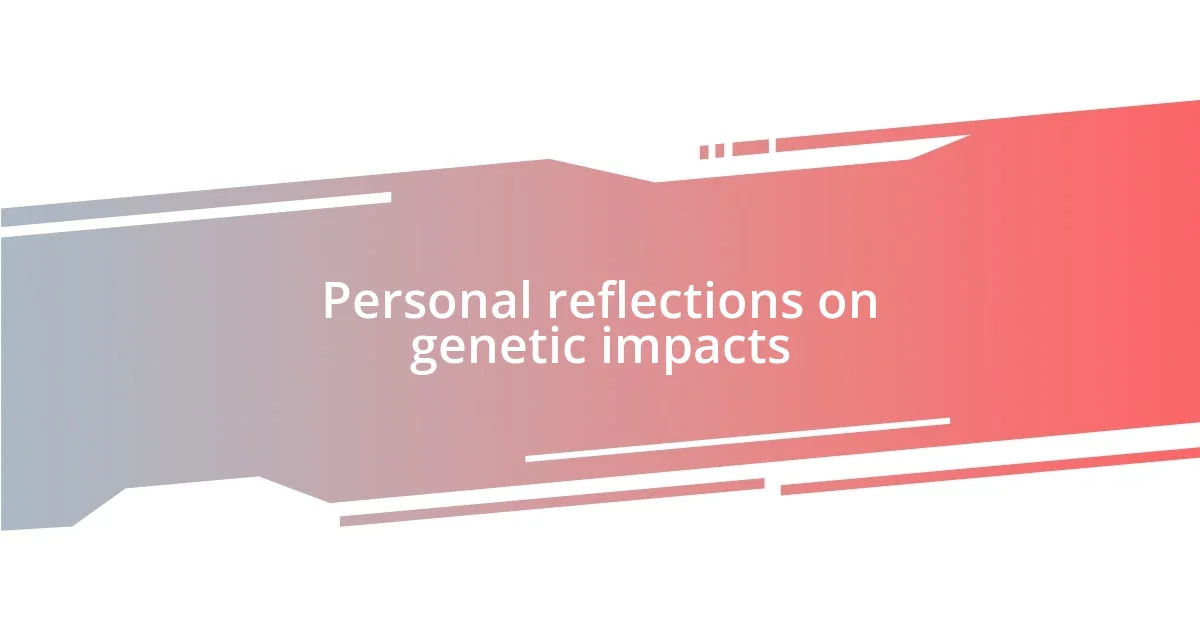
Personal reflections on genetic impacts
Reflecting on the impact of genetics, I often find myself amazed by the capacity for change that these advancements bring. Just last week, I was sitting down with an old friend whose family has been affected by Huntington’s disease. Listening to her voice tremble as she shared her fears about genetic testing made me realize how deeply intertwined personal stories are with these scientific developments. It struck me: How do we help those who live in the shadow of genetic uncertainties?
I also think about the way genetic technologies can alter our perceptions of identity. Recently, I had a conversation with my cousin, who is fascinated by ancestry testing. She excitedly recounted her newfound lineage, claiming connections to cultures she had never dreamt of. But it got me thinking—what are we losing in this pursuit of genetic self-discovery? Is our sense of belonging becoming too fractured, overly dependent on numbers and DNA sequences rather than shared experiences?
Navigating the implications of genetic advancements isn’t just a scientific endeavor; it feels intensely personal. In my travels, I’ve met individuals who’ve benefitted hugely from personalized medicine, transforming their lives. Their stories inspire hope, yet I can’t help but wonder: As we surge forward, are we forgetting the human element? Each breakthrough, while fascinating, brings with it a vortex of emotions—from hope to anxiety. What does it mean for us as a society if we tailor our existence through genetics at the expense of uncharted human experiences?










